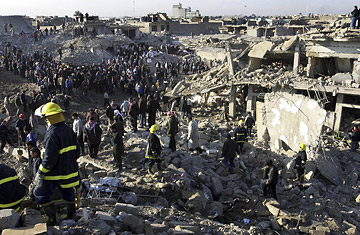
Iraqi fire fighters and residents of Mosul inspect the site where an explosion on January 23 destroyed an apartment building.
Virtually everyone at Forward Operating Base Marez has a story about the blast in downtown Mosul Jan. 23. Troops on the main base at the time recall feeling rocked by the boom, which detonated an estimated 15 tons of explosives stashed by insurgents in a building on the west side of town. Some soldiers patrolling the city in armored Humvees thought for a moment that a roadside bomb had hit them. And many across this city of nearly 2 million, people looked up in awe as a massive column of weirdly orange smoke rose into the sky.
U.S. and Iraqi officials say Mosul is the last urban stronghold of al-Qaeda in Iraq and the explosion was an unquestionable indication of the strength of the insurgent network in the city — even if the radical fighters did not set it off themselves.
Mosul's guerrilla fighters had managed to hide away an unusually large amount of bomb-making materials, despite a heavy presence by U.S. troops and Iraqi security forces in the city. A tip about the cache drew local police, who set about detonating the materiel they found in the above-ground rooms of the building. They failed to realize, however, that the basement contained an even larger store, according to U.S. military officials. The "controlled" blast wound up leaving an estimated 60 people dead. Now, many observers are wondering how the insurgents had managed to gather so much unnoticed.
On any given day in Mosul a number of U.S. aerial surveillance aircraft float overhead. There is a blimp, laden with cameras, tethered to the main base that hangs over the city. Unmanned drones buzz through the air gathering video. And at times jets high above scan Mosul as well. In the days after the explosion, military officials at FOB Marez began reviewing video tape with scenes from the site in the hours prior to the blast. Many cars pulled up to the building and then drove elsewhere into the city, leading military officials to believe that the visitors were insurgents picking up explosives to use in the dozens of roadside bombs that persistently plague the city. Watching the surveillance tapes, U.S. officials were able to track where a number of the cars came from and went to after visiting the cache. A fresh list of suspected insurgent safe houses or way stations soon emerged.
"Everybody is going in there to get their stuff to make their bombs," says 1st Lt. Jacob DeGuire, one of the officers tasked with organizing a raid on three of the newly developed targets. "So if you backtrack where they came from, maybe they came from their house or their bomb shop."
On the evening of Feb. 7, U.S. soldiers rolled from FOB Marez into downtown Mosul in a convoy of five Humvees, four Bradley fighting vehicles and four tanks. Joined by a small contingent of Iraqi army troops, the Americans pushed quickly to the first target of the night, a largely abandoned warehouse on the west side of town. The inner yard was empty, as was the adjacent office. But among the papers in the one desk were multiple copies of threat letters insurgents have been issuing lately in Mosul. Work with the Americans and you will die, the missives say.
Things seem promising as the soldiers move to the next site, a bank of storage containers a short distance away. Troops hack through padlocks with a heavy ax and the wrenching sounds over the low rumble of idling engines. One by one, seven corrugated metal doors are thrown up as flashlights on the end of guns swing through the inner darkness searching. But the troops find only flour and baking equipment, apparently the supplies for a nearby bakery.
The last target of the evening is a row of large houses nearby. Soldiers splinter the door at the first home and question a family the find inside. No one knows anything about insurgents or bombs. A quick search yields no traces of fighters having been there. The troops prepare to break down the doors of two other houses next door, only to be let inside by the families there awoken by the commotion. The stories of the residents are all alike. The soldiers and their interpreter have heard it before, countless times on other raids that fail to net the elusive insurgent fighters of Mosul. After a while, the interpreter stops translating, saying simply "same" with a wave of his hand.
DeGuire and others are disappointed as they wrap up the night's mission but feel they are on the right track with the new intelligence nonetheless. "It is a good lead," DeGuire says.
